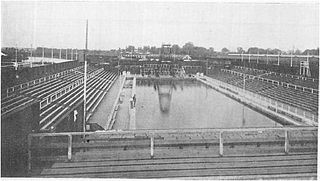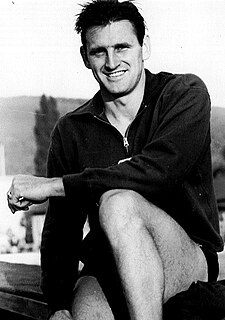Ivan Cuthbert Stedman was an Australian freestyle and breaststroke swimmer of the 1920s, who won a silver medal in the 4×200-metre freestyle relay at the 1920 Summer Olympics in Antwerp, Belgium. He was born in Oakleigh, a suburb in Melbourne, Victoria.

The men's 100 metre freestyle was one of six swimming events on the swimming at the 1908 Summer Olympics programme. It was the shortest of the three individual freestyle events, as the 50 yard freestyle had been dropped after its one appearance on the 1904 Summer Olympics programme. The 100 metre event was contested for the third time after it had been held at the 1896 and 1906 Olympics. The 1904 Olympics saw a 100-yard event. The competition was held on Friday 17 July 1908 and Monday 20 July 1908. Thirty-four swimmers from twelve nations competed. Each nation was limited to 12 swimmers.

The men's 100 metre freestyle event at the 1996 Summer Olympics took place on 22 July at the Georgia Tech Aquatic Center in Atlanta, United States. There were 60 competitors from 54 nations. Nations had been limited to two swimmers each since the 1984 Games. The event was won by Alexander Popov of Russia, the third man to successfully defend an Olympic title in the 100 metre freestyle. Gary Hall, Jr. returned the United States to the podium in the event after a one-Games absence. Gustavo Borges, the silver medalist in 1992, earned bronze. Popov and Borges were the 9th and 10th men to earn multiple medals in the event.

The men's 100 metre freestyle was a swimming event held as part of the swimming at the 1912 Summer Olympics programme. It was the fourth appearance of the event, which had not been featured at the 1900 Games. The competition was held from Saturday July 6, 1912, to Wednesday July 10, 1912. Thirty-four swimmers from twelve nations competed. The event was won by Duke Kahanamoku of the United States, the nation's second consecutive victory in the event. Cecil Healy took silver, the only medal in the event for Australasia, the short-lived joint team of Australia and New Zealand. Another American, Ken Huszagh, took bronze.
The men's 400 metre freestyle was a swimming event held as part of the swimming at the 1912 Summer Olympics programme. It was the third appearance of the event, which had been introduced in 1904. The competition was held from Thursday July 11, 1912 to Sunday July 14, 1912.

Pua Kele Kealoha was an American competition swimmer, Olympic champion, and former world record-holder. He was not related to Olympic swimming champion Warren Kealoha.
The men's 400 metre freestyle was a swimming event held as part of the swimming at the 1920 Summer Olympics programme. It was the third appearance of the event.
The men's 1500 metre freestyle was a swimming event held as part of the swimming at the 1920 Summer Olympics programme. It was the third appearance of the event.
The men's 4 × 200 metre freestyle relay was a swimming event held as part of the swimming at the 1920 Summer Olympics programme. It was the third appearance of the event.
The men's 200 metre breaststroke was a swimming event held as part of the swimming at the 1920 Summer Olympics programme. It was the third appearance of the event.
The men's 400 metre breaststroke was a swimming event held as part of the swimming at the 1920 Summer Olympics programme. It was the third and last appearance of the event.

The women's 100 metre freestyle was a swimming event held as part of the swimming at the 1920 Summer Olympics programme. It was the second appearance of the event, which was one of the two women's events held in 1912.
The women's 300 metre freestyle was a swimming event held as part of the swimming at the 1920 Summer Olympics programme. It was the first appearance of the event, which was later adjusted to 400 metres to match the men's competition.
The men's 100 metre freestyle was a swimming event held as part of the swimming at the 1924 Summer Olympics programme. It was the sixth appearance of the event, which had not been featured at the 1900 Games. The competition was held on Saturday July 19, 1924 and on Sunday July 20, 1924. There were 30 competitors from 15 nations. Nations were limited to three swimmers each, down from four in 1920. The United States swept the medals for the second consecutive Games, winning its fourth consecutive gold medal. Johnny Weissmuller beat two-time defending champion Duke Kahanamoku in the final. Kahanamoku was the first man to win three medals in the event. His brother Samuel Kahanamoku earned the bronze medal.

The men's 100 metre freestyle was a swimming event held as part of the swimming at the 1928 Summer Olympics programme. It was the seventh appearance of the event, which had not been featured only at the 1900 Games. The competition was held on Friday and Saturday, 10 and 11 August 1928. Thirty swimmers from 17 nations competed. Nations had been limited to three swimmers each since the 1924 Games. Johnny Weissmuller of the United States repeated as gold medalist in the event, the second man to do so. It was the fifth consecutive victory for an American swimmer in the men's 100 metre freestyle. István Bárány earned Hungary's first medal in the event since 1908 with his silver. Katsuo Takaishi's bronze was Japan's first men's 100 metre freestyle medal. Bárány and Takaishi prevented the Americans from sweeping the medals a third consecutive time, as the United States swimmers finished first, fourth, and fifth.

The men's 100 metre freestyle was a swimming event held as part of the swimming at the 1932 Summer Olympics programme. It was the eighth appearance of the event, which had not been featured only at the 1900 Games. The competition was held from Saturday August 6, 1932 to Sunday August 7, 1932. Twenty-two swimmers from ten nations competed. Nations had been limited to three swimmers each since the 1924 Games. The event was won by Yasuji Miyazaki of Japan, snapping a five-Games American win streak. Japan was only the third nation to win a gold medal in the event. The final was entirely made up of Japanese and American swimmers, three each; Japan took the top two places as Tatsugo Kawaishi earned silver. The top American, Albert Schwartz, earned bronze. While the American win streak had ended at five, the nation's podium streak ran to seven Games.

The men's 100 metre freestyle was a swimming event held as part of the swimming at the 1936 Summer Olympics programme. It was the ninth appearance of the event, which had not been featured only at the 1900 Games. The competition was held on Saturday and Sunday, 8 and 9 August 1936. Forty-five swimmers from 23 nations competed. Nations had been limited to three swimmers each since the 1924 Games. The event was won by Ferenc Csik of Hungary, the nation's first victory in the event since 1904 and third overall. For the second consecutive Games, Japan took two medals in the 100 metre freestyle, this time silver and bronze. The United States' seven-Games medal streak in the event ended as the nation's best result was sixth place by Peter Fick.

The men's 100 metre freestyle event at the 1948 Olympic Games took place between 30 and 31 July at the Empire Pool. There were 41 competitors from 19 nations. Nations had been limited to three swimmers each since the 1924 Games. The event was won by Wally Ris, returning the United States to the podium in the event after a one-Games absence broke a seven-Games streak. It was the sixth victory for an American in the 100 metre freestyle, most of any nation. Another American, Alan Ford, took silver. Géza Kádas of Hungary earned bronze, the nation's third medal in four Games. Japan's three-Games medal streak in the event ended with no Japanese swimmers competing due to the nation not being invited after World War II.

The men's 100 metre freestyle event at the 1952 Summer Olympics took place between 26 and 27 July at the Helsinki Swimming Stadium. There were 61 competitors from 33 nations. Nations had been limited to three swimmers each since the 1924 Games. The event was won by Clarke Scholes of the United States, the nation's second consecutive and seventh overall victory in the men's 100 metre freestyle. Japan, absent from the 1948 Games after World War II, returned to the podium in the event with Hiroshi Suzuki's silver. Göran Larsson earned Sweden's first medal in the event since 1908 with his bronze.

The men's 100 metre freestyle event at the 1956 Olympic Games took place between 29 and 30 November. There were 34 competitors from 19 nations. Nations had been limited to three swimmers each since the 1924 Games. The event was won by Jon Henricks of Australia, the nation's first medal in the event. Australia would win a second 0.4 seconds later and a third 0.9 seconds after that, sweeping the podium—the first sweep in the men's 100 metre freestyle since the United States did it in 1920 and 1924, and the first sweep of any event by Australian competitors. This year, the Americans finished fourth through sixth. It was the first time since 1924 that Japan had competed but not medaled.












